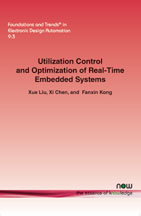Utilization Control and Optimization of Real-Time Embedded Systems
By Xue Liu, McGill University, Montreal, Canada, xueliu@cs.mcgill.ca | Xi Chen, McGill University, Montreal, Canada, xi.chen11@mail.mcgill.ca | Fanxin Kong, McGill University, Montreal, Canada, fanxin.kong@mail.mcgill.ca
Abstract
Real-time embedded systems have been widely deployed in mission-critical applications, such as avionics mission computing, highway traffic control, remote patient monitoring, wireless communications, navigation, etc. These applications always require their real-time and embedded components to work in open and unpredictable environments, where workload is volatile and unknown. In order to guarantee the temporal correctness and avoid severe underutilization or overload, it is of vital significance to measure, control, and optimize the processor utilization adaptively. A key challenge in this mission is to meet real-time requirements even when the workload cannot be accurately characterized a priori. Traditional approaches of worst-case analysis may cause underutilization of resources, while Model Predictive Control (MPC) based approaches may suffer severe performance deterioration when large estimation errors exist. To address this challenging problem and provide better system performance, we have developed several important online adaptive optimal control approaches based on advanced control techniques. Our approaches adopt Recursive Least Square (RLS) based model identification and Linear Quadratic (LQ) optimal controllers to guarantee that the systems are neither overloaded, nor underloaded. These proposed approaches, as well as the associated tools, can quickly adapt to volatile workload changes to provide stable system performance. To minimize the impact of modeling errors, we adopt the Adaptive Critic Design (ACD) technique and develop an improved solution that requires little information of the system model. To deal with the discrete task rates, we further propose to utilize the frequency scaling technique to assist the utilization control and optimization. The computational overhead of centralized approaches explodes as the scale of systems increases. To ensure system scalability and global stability, decentralized control and optimization approaches are desired. We leverage an efficient decoupling technique and derive several distributed approaches. These approaches adopt one feedback loop to adjust the task rate, and apply another feedback loop to control the CPU frequency asynchronously. As these two manipulated variables (i.e., the CPU frequency and task rate) contribute to the system performance together with a strong coupling, asynchronous control approaches may not be able to achieve the optimal performance. To handle this coupling, we further develop a synchronous rate and frequency control and optimization approach. This approach jointly and synchronously adjusts rate and frequency settings, and achieves enhanced system performance. All the aforementioned approaches are based on certain mathematical models. However, it is sometimes hard to develop an exact model to characterize a real-time embedded system. In order to deal with this issue, we further develop a model-free utilization control and optimization solution by applying the fuzzy logic control theory. The application of this theory allows us to achieve the desired performance in a nonlinear dynamic system without a specific system model. The proposed fuzzy utilization control approaches are stable and fast-converging, and achieve smaller tracking errors than model-based approaches.
Utilization Control and Optimization of Real-Time Embedded Systems
Real-time embedded systems are widely deployed in mission-critical applications, such as avionics mission computing, highway traffic control, remote patient monitoring, wireless communications, navigation, etc. These applications always require their real-time and embedded components to work in open and unpredictable environments, where workload is volatile and unknown. In order to guarantee the temporal correctness and avoid severe underutilization or overload, it is of vital significance to measure, control, and optimize the processor utilization adaptively.
This monograph examines utilization control and optimization in real-time embedded systems. In many practical real-time embedded applications, it is desired to keep the processors’ utilizations at the schedulable upper bounds. In this way, the systems deliver their best Quality of Service (QoS), and, at the same time, all real-time tasks remain schedulable. In order to achieve this goal, the authors present several effective solutions that adaptively adjust task rates and/or processor frequencies to enforce the desired utilization. Feedback control and optimization techniques have been leveraged to ensure that a system is neither overloaded nor underutilized.
